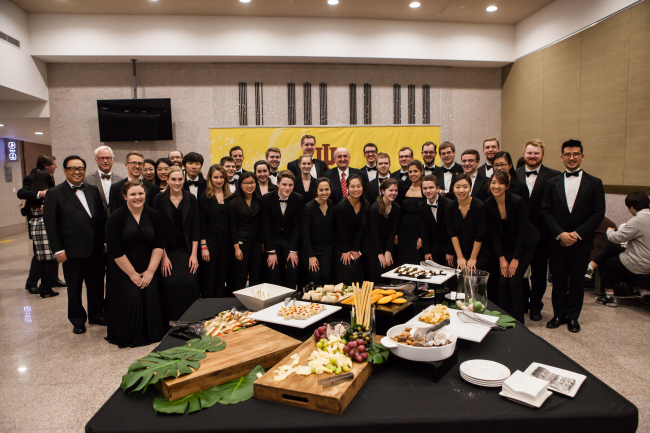Internationally regarded as one of the world’s most renowned musical institutions, members of the Jacobs School of Music at Indiana University’s chamber orchestra made their way to Seoul this week for the ensemble’s first ever concert in Asia since the establishment of the school more than a century ago.
In honor of the many close ties that the School of Music continues to maintain with local Korean universities, the chamber orchestra ― made up of 36 musicians, including two faculty members and six native Koreans ― performed at the Seoul Arts Center’s IBK Chamber Hall on Saturday night in front of members of the public and local IU alumni guests.
 |
Students and faculty of the Indiana University Jacobs School of Music pose during the chamber orchestra’s first concert in Asia at the Seoul Arts Center’s IBK Chamber Hall on Saturday. (Seoul Cyber University) |
“The Jacobs School of Music is widely considered as one of the finest institutions for the study of music in the world, and many of the most gifted faculty and students have come from Korea,” said Indiana University president Michael A. McRobbie.
“South Korea is also home to some of IU’s strongest institutional partnerships. IU is proud to partner with Ewha Womans University, Sungkyunkwan University, Seoul National University, Yonsei University and other Korean universities on a wide range of academic endeavors.”
This week the school signed a friendship agreement with the SNU College of Music looking to further foster musical cooperation between the two music schools with the initiative of offering both opportunities to exchange faculty and students as well as to collaborate on international music projects.
“Of all the countries that have students at Indiana University, after America, the most important for us is South Korea,” Gwyn Richards, dean of the Jacobs School of Music. “Of all the students in the Jacobs School of Music, 8 percent are from Korea.”
In the chamber orchestra’s first Asian concert, the local audience was offered a rare glimpse in the world of classical music performance ― a conductorless orchestra.
“One things that makes our orchestra unique is that there’s no conductor,” Richards said. “The students have to really focus on their interaction with each other ... they have to listen, they have to make eye contact. What we like about this is that it makes the students take on more responsibility because they have to lead.”
“We thought it might be a good thing to bring to Korea because it’s not common,” he added.
The orchestra’s near two-hour long performance featured Rossini’s Overture to Il signor Bruschino, Mozart’s Symphony No. 35 and Aaron Copland’s Suite from Appalachian Spring. In a tribute to the ensemble’s inaugural performance in Korea, the chamber orchestra ended the night with "Springtime in my Hometown," an arrangement that quoted the melody of one of the nation’s most beloved folk songs ― “Arirang.”
By Julie Jackson (
juliejackson@heraldcorp.com)








